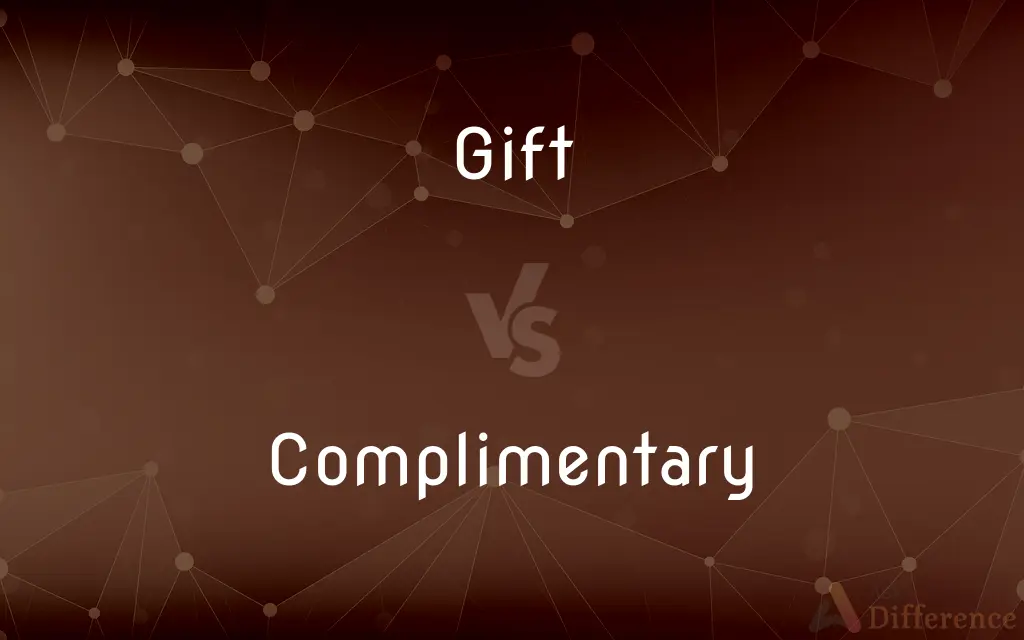Gift vs. Complimentary — What's the Difference?
By Maham Liaqat & Fiza Rafique — Updated on March 10, 2024
A gift is a present voluntarily given without expectation of return, while complimentary refers to something provided for free, usually as a courtesy.

Difference Between Gift and Complimentary
Table of Contents
ADVERTISEMENT
Key Differences
A gift is something given willingly to someone without the expectation of payment or anything in return. It's often a symbol of affection, friendship, gratitude, or support, emphasizing the personal connection between the giver and the recipient. Complimentary, on the other hand, denotes items or services provided free of charge, typically as part of a promotional effort, customer service, or as a courtesy in various settings, such as hotels or events, highlighting a business or institutional gesture rather than a personal one.
While gifts are usually chosen with the recipient's preferences or needs in mind, reflecting a deliberate and thoughtful selection process, complimentary items or services are generally standard or uniform, offered to many people regardless of individual taste. This distinction underscores the personalized nature of gifts compared to the more generic nature of complimentary offerings.
Gift-giving is a practice observed in personal, cultural, and religious contexts worldwide, serving as a means of expressing a range of sentiments and fostering relationships. Complimentary offerings, however, are often used as marketing tools, customer satisfaction strategies, or gestures of hospitality, aiming to create goodwill, enhance reputation, or encourage future business.
The value of a gift lies in its meaning and the intent behind it, which can be significant regardless of its monetary worth. In contrast, the value of complimentary items or services is typically seen in terms of convenience, savings, or the enhancement of an experience, such as a complimentary upgrade on a flight or a free sample in a store.
Gifts can be tangible items like books or jewelry, or intangible such as acts of service or experiences. Complimentary items, while also ranging from tangible goods to services, are usually encountered in commercial or professional environments, and their provision is often influenced by policy or strategy rather than personal initiative.
ADVERTISEMENT
Comparison Chart
Purpose
To show affection, gratitude, or honor.
To provide goodwill, enhance satisfaction.
Personalization
Highly personalized.
Usually standard and not personalized.
Recipient
Individuals or select groups.
Any customer or guest, often broadly targeted.
Emotional Value
High, with sentimental significance.
Appreciated, but less sentimental value.
Context
Personal occasions, celebrations.
Business contexts, customer service.
Expectation of Payment
None, purely voluntary.
None, provided as courtesy or promotion.
Relationship
Strengthens personal connections.
Aims to improve business relationships.
Type of Exchange
Personal, between individuals.
Business-oriented, company to customer.
Selection Criteria
Based on recipient’s preferences.
Based on company policy or promotion.
Common Forms
Objects, money, services.
Services, upgrades, samples.
Compare with Definitions
Gift
A voluntary transfer of something without expectation of return.
The handmade scarf was a thoughtful gift from her grandmother.
Complimentary
Often part of a promotional strategy.
Complimentary access to premium content was provided with every subscription.
Gift
Varied across cultures and occasions.
In their culture, exchanging gifts is an essential part of the New Year celebration.
Complimentary
Provided free of charge, often by a business.
Guests enjoyed complimentary breakfast at the hotel.
Gift
Can be an item, service, or experience.
The concert tickets were an amazing gift that they both enjoyed.
Complimentary
Used to enhance customer satisfaction or loyalty.
The airline offered complimentary upgrades to frequent flyers.
Gift
Can signify affection, gratitude, or social bond.
He gave his teacher a gift to show appreciation for her support.
Complimentary
Can be a service, product, or privilege.
Complimentary Wi-Fi access was available throughout the convention center.
Gift
Often involves careful selection to suit the recipient.
For her birthday, they chose a gift that reflected her love for gardening.
Complimentary
Not personalized, generally available to many.
Complimentary samples of the new product were distributed at the launch.
Gift
A gift or a present is an item given to someone without the expectation of payment or anything in return. An item is not a gift if that item is already owned by the one to whom it is given.
Complimentary
Expressing, using, or resembling a compliment
A concert that received complimentary reviews.
Gift
Something that is bestowed voluntarily and without compensation
I received several gifts for my birthday. Your gift of $100 is greatly appreciated.
Complimentary
Given as a courtesy at no charge
Complimentary copies of the new book.
Gift
The act of giving
The painting came into their possession by gift.
Complimentary
In the nature of a compliment.
A complimentary remark
Gift
A talent, endowment, aptitude, or inclination
She has a gift for playing the piano.
Complimentary
Free; provided at no charge.
Complimentary drinks
Gift
To present something as a gift to
Gifted his niece with a watch.
Complimentary
With respect to the closing of a letter, formal and professional.
Gift
To give as a gift
"King Charles II ... had gifted the land of Carolina to certain members of his court" (Marilyn Yalom).
Complimentary
Expressive of regard or praise; of the nature of, or containing, a compliment; as, a complimentary remark; a complimentary ticket.
Gift
To endow with
Nature has gifted her with a fine voice.
Complimentary
Conveying or resembling a compliment;
A complimentary remark
Gift
Something given to another voluntarily, without charge.
Complimentary
Costing nothing;
Complimentary tickets
Gift
A talent or natural ability.
She had a gift for playing the flute.
Gift
Something gained incidentally, without effort.
Gift
The act, right, or power of giving or bestowing.
The office is in the gift of the President.
Gift
(transitive) To give as a gift or donation.
Gift
(transitive) To give away, to concede easily.
Gift
Anything given; anything voluntarily transferred by one person to another without compensation; a present; an offering.
Shall I receive by gift, what of my own, . . .I can command ?
Gift
The act, right, or power of giving or bestowing; as, the office is in the gift of the President.
Gift
A bribe; anything given to corrupt.
Neither take a gift, for a gift doth blind the eyes of the wise.
Gift
Some exceptional inborn quality or characteristic; a striking or special talent or aptitude; power; faculty; as, the gift of wit; a gift for speaking.
Gift
A voluntary transfer of real or personal property, without any consideration. It can be perfected only by deed, or in case of personal property, by an actual delivery of possession.
Gift
To endow with some power or faculty. See gift{4}.
He was gifted . . . with philosophical sagacity.
Gift
Something acquired without compensation
Gift
Natural qualities or talents
Gift
The act of giving
Gift
Give qualities or abilities to
Gift
Give as a present; make a gift of;
What will you give her for her birthday?
Common Curiosities
Why do businesses offer complimentary items or services?
Businesses offer complimentary items to create goodwill, enhance customer satisfaction, and encourage future patronage.
What distinguishes a gift from a complimentary item?
A gift is personally given to express sentiment, while a complimentary item is provided for free, usually for promotional purposes or as a courtesy.
How does the intent behind giving a gift differ from offering something complimentary?
The intent behind a gift is to express personal sentiments, whereas complimentary offerings aim to promote a business or service.
Do all gifts come from individuals?
Gifts primarily come from individuals but can also be given by groups or organizations, often with a personal or humanitarian motive.
What role do complimentary items play in marketing?
Complimentary items play a crucial role in marketing by enhancing customer experience, building brand loyalty, and serving as effective promotional tools.
How do cultural practices influence gift-giving?
Cultural practices significantly influence gift-giving, dictating when, how, and what types of gifts are appropriate to give and receive.
Can a gift be complimentary?
While gifts are not typically considered complimentary in the promotional or business sense, any item given freely can be seen as a gift in a broader sense.
Can complimentary items be personalized?
While typically standardized, some complimentary items can be personalized, especially in high-end services or loyalty programs.
What impact do complimentary items have on customer loyalty?
Complimentary items can have a positive impact on customer loyalty by creating a sense of valued treatment and enhancing overall satisfaction.
Is the value of a gift always monetary?
No, the value of a gift often lies more in its emotional significance and the thought behind it than in its monetary worth.
How do personal relationships affect the nature of gifts?
Personal relationships greatly affect the nature of gifts, with more intimate relationships often leading to more thoughtful and personalized gifts.
Can a complimentary service ever become a gift?
While the contexts differ, a complimentary service provided with personal care or extra effort can feel like a gift to the recipient.
Are complimentary services a recent phenomenon?
Offering complimentary services is a long-standing practice in many industries, evolving over time with business strategies and customer expectations.
How do businesses decide what to offer as complimentary?
Businesses decide based on factors like brand image, customer expectations, and competitive practices, aiming to enhance customer experience and value.
Why might someone prefer a gift over something complimentary?
Someone might prefer a gift over something complimentary because of the personal connection and sentiment it represents.
Share Your Discovery

Previous Comparison
Gherkin vs. Cornichon
Next Comparison
Segment vs. FragmentAuthor Spotlight
Written by
Maham LiaqatCo-written by
Fiza RafiqueFiza Rafique is a skilled content writer at AskDifference.com, where she meticulously refines and enhances written pieces. Drawing from her vast editorial expertise, Fiza ensures clarity, accuracy, and precision in every article. Passionate about language, she continually seeks to elevate the quality of content for readers worldwide.














































